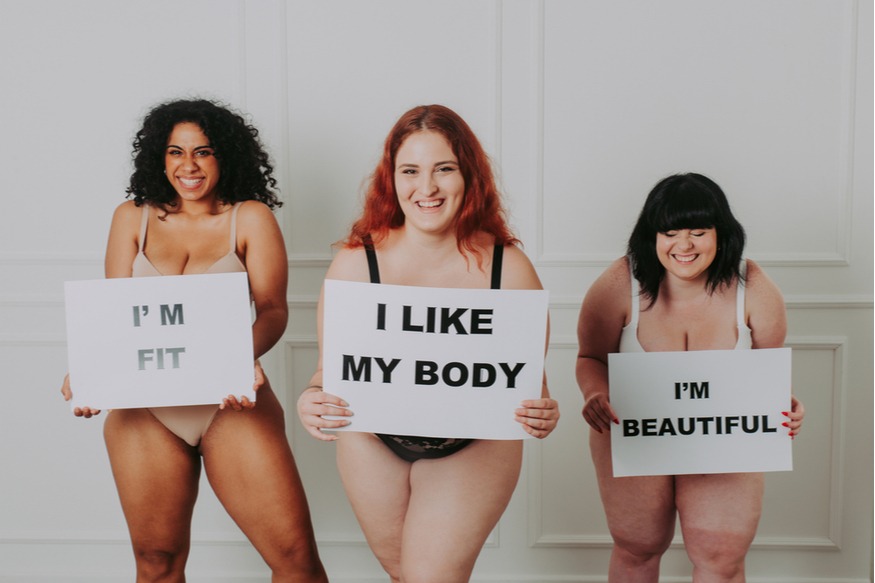
Body positivity: healthy or unhealthy?

Twenty years ago, there were only thin women walking the catwalk, but nowadays there is much more room for other body sizes as well. Various fashion brands and shops even focus on women with curves, and plus size models regularly grace the cover of magazines. Great for the average woman’s self-image, right? Well, there are also people who are critical of the body positivity movement. Do they have a point?
What is body positivity?
Never going on a diet again, never staring at your tummy rolls in the mirror again, and never having to feel embarrassed about eating fries in public again; there are many positive things about embracing yourself and accepting your body.
Body positivity is a movement that originally took a stand in defence of overweight people. The movement eventually started focussing on a positive mindset for all people, thin or big, black or white, man, woman, or otherwise. So it’s doesn’t just advocate on behalf of overweight women, as many people seem to believe.
Beauty is a construct
Body positivity stands for challenging beauty standards, building positive self-image, and striving to give people the strength to walk through life with confidence. One of the key points is that beauty is nothing more than a social construct. And that this construct shouldn’t undermine your self-worth.
”Beauty is nothing more than a social construct.”
The movement encourages you to love yourself and embrace your physical traits. Every body is beautiful in its own way. A word like ‘fat’ is not seen as a insult by followers of the movement. There a fat people in the world, just like there are thin people, short people, and tall people. It’s about accepting and celebrating that diversity.
Fanatical critics
But that acceptance and appreciation for people who don’t fit the beauty standard isn’t ubiquitous to say the least. Especially overweight people are put down on a regular basis. People stare at them, laugh at them, ignore them, or publicly shame them.
Being fat is your own fault
There are a couple of beliefs rooted in bias that are said to contribute the most to the stigma and the exclusion of overweight people; they eat too much and don’t exercise enough, being fat is their own fault, losing weight is simply a matter of discipline, and thin people are always healthier and more successful.
It’s no wonder that the body positivity movement receives a lot of criticism. There are many fanatical critics on the internet who claim that the movement glorifies obesity and encourages overweight people to be ‘lazy and ugly’. Other people are more moderately critical, mainly worrying about the consequences of general health if obesity is normalised. That sounds a bit more reasonable, but it still implies that you’re unhealthy or don’t fit the norm if you’re curvy or overweight.
Bias in the healthcare system
According to journalist Asha ten Broeke, these biases are even present in our healthcare system. In a column for Volkskrant, she writes about doctors who don’t look beyond the extra weight and attribute every healthcare problem to obesity. For example, a woman who had pulmonary embolism was told that there was simply too much weight pushing down on her longs. Or a woman with hip pain who was told to learn to live with it because she was obese, even though it turned out she had a spine curvature disorder.
If even doctors are influenced by stigmas, what can you do if you’re overweight and working on a positive self-image?
Stigmas are unhealthy
At the same time, there are various doctors and nutritionists who already broke many stigmas and try to educate the public, like Liesbeth van Rossum (endocrinologist at Erasmus University) and Mariette Boon (specialist internal medicine in training at LUMC).
Gaining weight by looking at food
Their work shows that losing weight is much more complicated than simply eating healthy and exercising regularly. Your body produces about six-hundred hormones that all influence your body fat percentage and work differently in every body. Your weight is also determined by your genes for fourty to seventy percent. So it really is true that one person gains weight by simply looking at food, while another person can eat crisps all day long and never gains weight.
”Your weight is determined by your genes for fourty to seventy percent.”
So, time for a strict diet then? Nope, quickly throw away all those crash diets, please. Research conducted in Melbourne showed that fifty obese people still struggled with disrupted hormone levels after a year after they went on a crash diet. Those hormonal changes even increased their appetite, which eventually led to them abandoning the diet and gaining weight until they were even bigger than before.
Stress and overeating
In addition to being hurtful, bias and prejudice can also be detrimental to your mental and physical health. Janet Tomiyama studied the impact of weight stigma on people’s health at the University of California. She conducted a study where some participants were asked to leave the (which they believed to be) ‘shopping and psychology experiment’ because they were too fat and the exclusive clothes wouldn’t fit them.
Afterwards, the cortisol levels of these people were much higher compared to the control group, who did not have to endure this humiliation. Cortisol is a stress hormone that is associated with overeating as a result of negative emotions. It changes certain connections in your brain, suddenly making you crave fatty and sugary foods. It’s quite ironic that when you’re faced with body shame, your body pushes you to overeat.
Conclusion? Sometimes it’s better to accept your body the way it is.
Tips to love yourself
Of course this is easier said than done. Especially in a society where, in spite of the progress made in recent years, you are still constantly confronted with the societal norms of body and weight.
Do you want to silence those norms? At least in your own head? There are things you can try:
- Fight the prejudice with self-acceptance and allow yourself a rich life. Don’t say “I’m not allowed to do that until I’ve lost weight” and don’t wait to buy that nice dress until you fit into a smaller size. You deserve to enjoy life. Are you hard on yourself, because you’re ashamed and afraid that those negative voices may be right to some extent? Think about how you would talk to a friend or a child. We bet that you would be a lot kinder then. You deserve that same compassion.
- Don’t just focus on your body, but also on your emotional and mental state. You have no idea how much negative energy it takes to constantly worry about your weight and how counterproductive this obsession often is. If you feel mentally stable, you are also less inclined to give in to overeating or emotional eating. We don’t say this because you need to lose weight, but because most people who try to eat away their frustrations or sadness do not necessarily feel better about themselves afterwards.
- Pay attention to what you do, not what you look like. It’s a misconception that big people can’t lead a healthy life. Do you have a healthy diet? Do you regularly go on a hike, go for a swim, or jump on your bike? And do you have a stable mental state? Be happy that you have a body that does exactly what it should do and what you want it to do. Work with what you got and be grateful for your body. You’re beautiful just the way you are.
Guilty of stigmatising? Learn how to turn it around!
And now for the bodyshamers! We know, humans are innately biased. We spend all day putting labels on people in order to make sense of the world. We often do this subconsciously. But when we let our bias influence our decisions and willingly hurt or exclude people, it’s definitely time for a change.
Be more empathetic
Do you ever catch yourself thinking ‘that obese man has no willpower’? Or that the fat kid in the class is not as smart as the other kids? Or that your overweight colleague should skip that birthday cake?
Don’t chastise yourself, it happens to all of us. But if we’re more aware of it, we can do something about it. It’s not just hurtful for the other person to encounter bias based on their appearance, it’s also better for our own mental health if we’re a little milder, friendlier, and open-minded in our lives.
A couple of tips:
- Correct your thoughts the moment you become aware of them
- Learn how to turn negative thoughts around and transform them into positive thoughts
- Appreciate people for who they are and try to see the good in everyone
Your friend probably owns a mirror
Keep in mind that your beauty standard doesn’t always match that of someone else. When you realise other people also have thoughts about your appearance, it generally makes you a little more humble and hopefully a little kinder.
There’s no need for you to share the criticism or bias that pops into your head. Do you suspect your friend has gained some weight? Let it go. She probably owns a mirror and doesn’t need your nosy and piercing gaze, thank you very much. It would be great if the focus on people’s bodies would disappear altogether and if we wouldn’t label people with nasty terms like ‘pig’ or ‘skeleton’, but would simply appreciate the fact that there are many body types in this world.
Perhaps then we can look beyond the physical and truly see the person standing in front of us.
Also read: the story of plus size model Fabiënne Schriek (26)








Respond or ask a question
0 comments